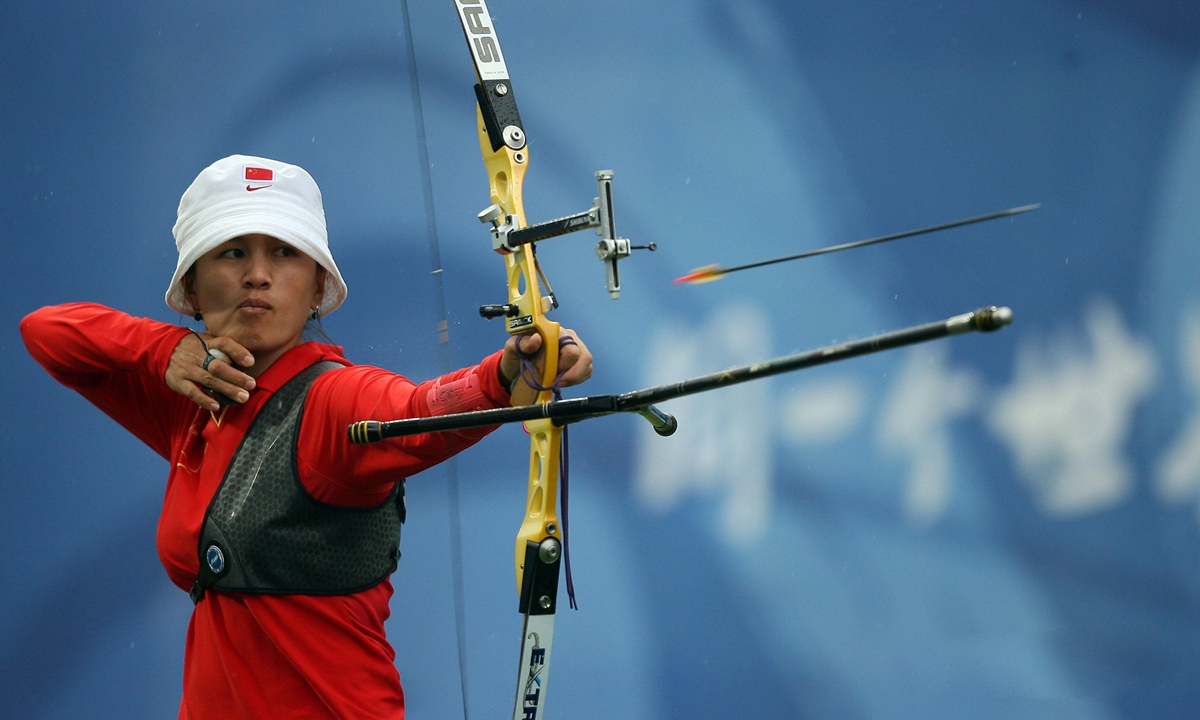
Zhang Juanjuan competes in an archery event. Photo: Courtesy of Zhang Juanjuan
China's sports authority General Administration of Sport of China recently announced the launch of the 2025 internship and training program for retired athletes at sports schools, providing them with opportunities to gain practical experience and prepare for careers in sports education.
This is not the first time that China has demonstrated its commitment to supporting retired athletes.
Earlier this year, the Ministry of Education issued its first policy document dedicated to strengthening the ranks of physical education teachers, with one of its key innovations being the creation of a pathway for outstanding retired athletes to teach in primary and secondary schools.
Wang Fuqiu, a professor at the department of social sports at the Beijing University of Chemical Technology, told the Global Times that with policy support at the national level, a comprehensive support system will be established to ease concerns about life after retirement for athletes, coaches and their families.
"Retired athletes bring with them exceptional expertise and extensive hands-on experience, giving them an irreplaceable advantage in teaching sports techniques," he said.
"This unique strength ensures both the precision and efficiency of skill instruction, providing a highly reliable foundation for cultivating young sporting talent," he noted, before noting this approach will help establish a sustainable and closed-loop system for nurturing athletic talent for a long-term perspective.
Identity transformation
At a training base in Northeast China's Liaoning Province, Wang Jiao stands by the wrestling mat, her eyes fixed on the training athletes.
From time to time, she steps forward to personally demonstrate techniques, patiently explaining the nuances of the sport.
A gold medalist in the women's freestyle wrestling 72kg category at the Beijing 2008 Olympics, Jiao once stood atop the world stage.
Today, she has chosen to remain with her provincial team as a coach, passing on her expertise to the next generation of athletes, step by step.
Wang Jiao told the Global Times that many retired athletes face challenges in adjusting to their new identities, but she has navigated this transition effectively.
"My coach once told me, 'The moment you step down from the podium, you are no longer a champion. You must always remember where your focus should be,'" she recalled. "That advice has stayed with me and helped me keep a clear head."
In Jiao's view, retirement from sports is far more than a simple career shift; it requires both physical and psychological transformation.
"When athletes step away from the spotlight, the first challenge they face is readjusting their physical condition and rebuilding their sense of identity," she noted.
As a former wrestler, Jiao pointed out that injuries accumulated over the course of an athletic career often continue to impact life after retirement.
"I believe there should be stronger support for retired athletes in terms of injury protection and rehabilitation, along with career training and psychological counseling to help them transition more smoothly into their new roles," she said.
Today, Jiao is dedicated to nurturing top-level athletes for both the national and provincial teams. She focuses not only on their performance, but also on their personal growth and character development.
"With the continuous evolution of sports competitions, today's athletes face more complex and challenging obstacles than we did," she said. "This means they must work even harder, and I am committed to being a source of support for them."

Wang Jiao (left) mentors young Chinese wrestlers. Photo: IC
Legacy in actionAt the Beijing 2008 Olympics, a young Chinese archer broke South Korea's 24-year streak in women's individual archery, defeating top competitors Joo Hyun-jung, Yun Ok-hee, and Park Sung-hyun to claim gold. Her victory secured China's first-ever Olympic gold in the discipline.
Her name was Zhang Juanjuan. Today, at 44, Zhang has long retired and works at the Shandong Sports Training Center, where she has become a sports project manager. She remains dedicated to supporting and mentoring young athletes.
"Transitioning from the arena to a behind-the-scenes role, the most important task is continuous learning and self-improvement," she told the Global Times.
"Now I need to take the initiative to serve the athletes and guide them along their path. Therefore, learning how to effectively pass on knowledge is crucial."
In Zhang's view, athletes are accustomed to having a singular goal on the field, but once they transition, they must develop entirely new skills - such as team management and how to support younger athletes.
These, she believes, are fresh challenges that require active learning and adaptation.
"Maintaining an open mind, learning through practice, and growing from setbacks - that is the true path to a successful transition," she said.
"In the future, I plan to further promote the sport of archery and bring it into businesses, schools, and communities," she said.
She noted that she hopes to provide young people with an introduction to sports, while also serving as a chief advisor in the professional field to help young athletes overcome practical challenges.
Given the typically short span of athletic careers, post-retirement planning has become a common concern for many athletes.
Zhang believes that earlier and more systematic career training would make the transition much smoother.
"Active athletes should plan ahead during their careers, broaden their knowledge, and prepare themselves for future transitions," Zhang said.
"Whatever path they choose in the future, they must continue to enrich themselves and fill in any academic gaps left by their time as professional athletes," she noted.





